In recognition of April as National Youth Sports Safety Month, MomsTeam has asked 30 experts to write a blog answering two questions: first, how or why did they get into their field, and second, how have they made a difference in the life of a youth athlete in the past year.
Today, we hear from Eric Laudano, Head Athletic Trainer and Manager of Sports Medicine at the University of Pennsylvania and a MomsTeam expert.
How did I get into my field?
I have a lot of medical professionals in my family, so I have always been around the medical field. I have also been interested in sports my entire life. I heard about the field of athletic training while researching careers which incorporated both medicine and athletics.
I began studying sports medicine and athletic training while in undergrad at Keene State College in Keene, New Hampshire. They have an outstanding athletic training program and I decided to major in it and pursue my career.
Over the course of my career I have had the opportunity to work at all levels of athletics and see parts of the country and world that I may have never seen if it wasn't for my profession. I have the unique opportunity to make a difference in the lives of young athletes every day, which is something that makes being an athletic trainer so special and unique. Not only are do we provide young athletes with health care but we are their mentors as well.
How have I made a difference in an athlete's life? 
Just recently, I was working a typical day when I received a phone call from my assistant athletic trainer summoning me to the parking lot of our basketball arena, where one of our assistant strength and conditioning coaches was found lying on the pavement unconscious and unresponsive. I immediately grabbed one of our portable automatic external defibrillators (AED) and ran to the parking lot.
Upon arrival I found the coach face down unresponsive, not breathing, and with no pulse. I immediately began CPR and administered a shock from the AED. I was able to get a pulse, but he was still unconscious. I continued rescue breathing until EMS arrived. They transported him to the ER, where he was placed in a medically-induced coma, medically paralyzed, and his body temperature lowered (medical hypothermia). Needless to say, he was in critical condition. Doctors determined that he he had suffered a major heart attack in the parking lot.
After three days, the coach was brought out of the medically-induced coma and paralyzation and his body re-warmed. After a week in the hospital, he wsa discharged to cardiac therapy, and is expected to make a full recovery.
The important message of my story is that the availability of an AED - at any level of athletics, at any event, no matter what the age group - could save a life. It is important for parents of youth athletes to check with the coach, administrator, or director of any team, club, league, camp, or tournament to see if an AED is present for your child's games and practices. You could save a life!
Eric Laudano is Head Athletic Trainer and Manager of Sports Medicine at the University of Pennsylvania. In addition to serving as athletic trainer for both the football and men's lacrosse teams, Eric manages the overall operation of the athletic training department and a staff of 8 full-time and four part-time athletic trainers, and is responsible for the health and wellness of 1,000 athletes in 32 intercollegiate varsity sports.
Eric was previously Head Athletic Trainer for the New England Seawolves of the Arena Football League and a training camp assistant athletic trainer for a number of National Football League teams, including the New York Giants, Pittsburgh Steelers, and Buffalo Bills, for whom he also served as assistant athletic trainer during the 2003 season. In 2007 and 2008, Eric was one of three athletic trainers overseeing the medical care of NFL prospects during the NFL Combine in Indianapolis. From 1999 to 2001 Eric was assistant athletic trainer at Yale, and from 2006 to 2008 was head football athletic trainer at Indiana State University. In 2004, he was a member of the United States Olympic Committee's athletic training staff at the Olympic Training Center in Lake Placid, New York.
Eric received a B.S. in sports medicine/athletic training from Keene State College in Keene, New Hampshire and a Masters in biomedical/medical laboratory sciences from Quinnipiac University. A Connecticut native, Eric currently resides in Cherry Hill, New Jersey with his wife, and young son and daughter.


















